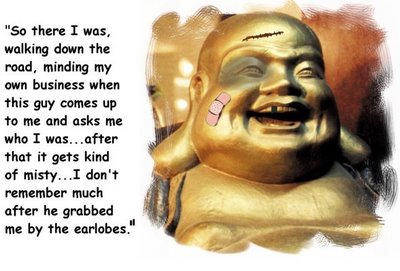 So where to start this mapping of the territory, this description of the taste of an orange? The obvious first post would be on the Buddha himself.
So where to start this mapping of the territory, this description of the taste of an orange? The obvious first post would be on the Buddha himself.Of course, that enterprise is fraught with danger. As Karen Armstrong wrote in her excellent biography of the Buddha:
Some Buddhists might say that to write a biography of Siddhatta Gotama is a very un-Buddhist thing to do. In their view, no authority should be revered, however august; Buddhists must motivate themselves and rely on their own efforts, not on a charismatic leader. One ninth-century master, who founded the Lin-Chi line of Zen Buddhism, even went so far as to command his disciples, "If you meet the Buddha, kill the Buddha!" to emphasize the importance of maintaining this independence from authority figures. Gotama might not approved of the violence of this sentiment, but throughout his life he fought against the cult of personality, and endlessly deflected the attention of his disciples from himself. It was not his life and personality but his teaching that was important. He believed that he had woken up to a truth that was inscribed in the deepest structure of existence. It was a dhamma; the word has a wide range of connotations, but originally it denoted a fundamental law of life for gods, humans and animals alike. By discovering this truth, he had become enlightened and had experienced a profound inner transformation: he had won peace and immunity in the midst of life's suffering. Gotama had thus become a Buddha, an Enlightened or Awakened One. Any one of his disciples could achieve the same enlightenment if he or she followed this method. But if people started to revere Gotama the man, they would distract themselves from their task, and the cult could become a prop, causing an unworthy dependence that could only impede spiritual progress.
And that says quite a lot right there. I would strongly encourage anyone who is curious about this man, Siddhatta Gotama, to first be careful not to confuse the teacher with the teaching, and then to go and read Armstrong's Buddha.
But as Armstrong points out, Buddhism is not based on Buddhism the way, say, Christianity is based on the Christ; in fact, I bet that Gotama would be quite disappointed to learn that we were calling the dhamma "Buddhism."
Buddhism is about the here and now, your here and now, your life, you. It might as well be called "Insert-Your-Name-Here-ism." As my teacher recalls his teacher saying, "Your enlightenment will be a thousand times greater," because it's not something that others are experiencing, it's happening to you.
By the way, the "Kill the Buddha" teaching is widely misunderstood. My interpretation is that if you see something or someone, any one thing or person, and identify it as "Buddha," you are not recognizing the interconnectedness of all things. Everything is Buddha, so if you meet an individual "Buddha" it is just a manifestation of your own ignorance, and it's that ignorance that you're being exhorted to kill.
So you can put down that fat guy now.

No comments:
Post a Comment